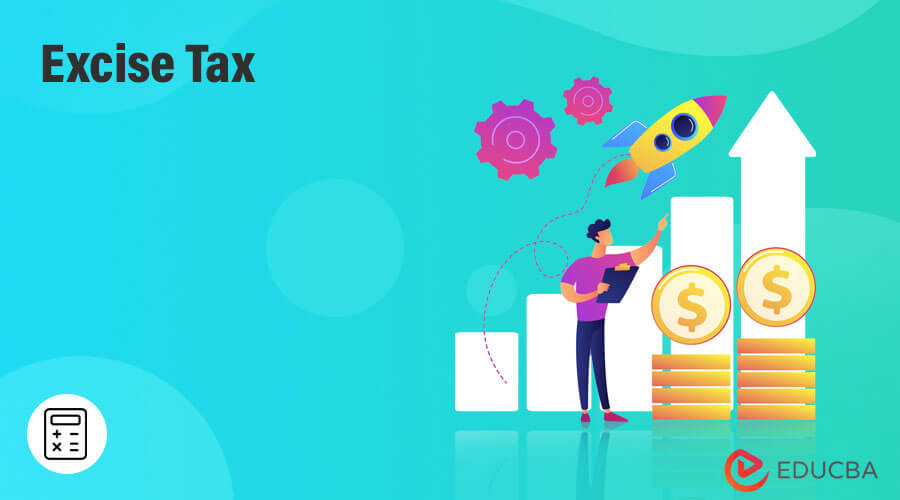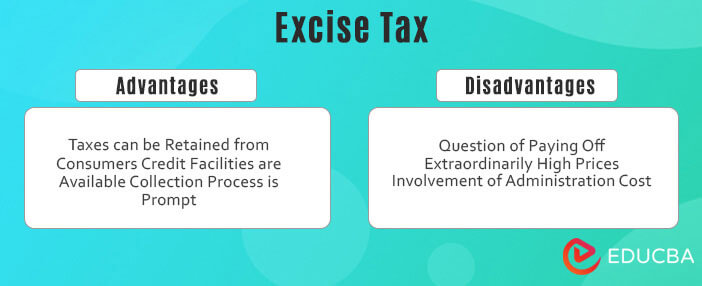Updated July 15, 2023
Introduction to Excise Tax
Excise tax is an obligation that is to be paid by the manufacturer at the time of manufacturing the goods. That is why excise taxes include in the price of the goods purchased. Excise tax is popularly known as Excise duty because it is the duty of the manufacturer to pay taxes to the government before they put their items on sale.
Explanation
Excise taxes are levied on the manufacturer initially. Then the liability of the taxes shifts to the ultimate customers who consume the goods because the goods sold in the market include the excise tax in the Maximum Retail Price (MRP). It’s a fact that indirectly these taxes are borne by the government to the manufacturers, but the customers will have to pay them; that is why this tax is also known as Indirect Taxes. Certain conditions are prevailing in the market regarding excise taxes. For example, if a manufacturing concern is merely improving or improvising certain goods, it will not consider as manufacture. Therefore before posting any incidence of taxes, the definition and inclusion of the term manufacture should be clear. Hence, the excise tax liability will again query who will pay the excise tax to the government.
How Does it Work?
Excise Taxes are the indirect taxes included in the product prices. This tax is first levied on the customers, and then at a later stage, it is taken from the customers indirectly. This is a simple way of charging taxes on manufacturing. But sometimes conflicts arise because the term manufacture is unclear to most manufacturers. It has been seen that the incidence of taxes question in the Supreme Court regarding excise taxes. Like, repair and maintenance cannot consider as manufacture. Therefore now the conflict arises as to who will pay the excise duty or whether any excise duty is legible or not. So some famous verdicts upon excise taxes are to follow by both parties.
Example of Excise Tax
A manufacturing company is manufacturing some excisable goods. The direct material cost is INR 30,000, which includes a 12.36% excise duty. The salary to staff is INR 50,000, the cost of repair and maintenance comes to INR 6000, the R&D cost to the company comes to INR 2,700, Interest and other finance costs INR 3400, Cost of dismantling the machinery INR 1300, the selling and distribution cost INR 4500, Scrap value INR 1600. Please compute the cost of production o the customers considering the effect of excise duty.
Solution:
| Particulars | INR |
| Cost of direct material | 30,000 |
| Less: Excise duty | 33 |
| Material Consumed | 29,967 |
| Salary to staff | 50,000 |
| Cost of repair and maintenance | 6,000 |
| Research and development cost | 2,700 |
| Interest and other finance costs | 3,400 |
| Total cost | 92,067 |
| Less: Scrap Value | 1,600 |
| Cost of production | 90,467 |
Types of Excise Tax
Basic Excise Tax: Basic excise tax is 12.36% of the cost of materials consumed to prepare the goods. The government bears the tax to the manufacturers when manufacturing the goods. Special Excise Duty: This tax is also a kind of excise duty levied on some special items; these items also qualify the requirement of the manufactured excisable goods.
Education Cess on Excise Duty: In some cases, excise duty is levied on education cess. The final computation of manufacturing costs includes this tax also. Excise duty in Export Units: In some export units, the excise duty is levied and is termed as Excise duty on the export unit.
Who Pays Excise Tax?
In the first stage, the excise tax is paid to the government by the manufacturers of the excisable goods. Later in the second stage, the manufacturers compute the prices of the goods, which is set so that the price includes the excise tax components. Therefore, the ultimate liability to pay the excise tax lies with the consumer of that goods.
Advantages and Disadvantages
Below are some of the prominent advantages and disadvantages of excise tax.
Advantages
- Excise taxes are very convenient for the manufacturers to pay at the time of manufacture because this can be easily retained from the ultimate consumers later.
- In excise taxes, there are also some credit facilities available. Therefore, the payer can get the tax credit in the future.
- The collection process of excise taxes is very prompt. Shifting liability can make the tax incidence for the manufacturer a bit easier, encouraging them to make excisable goods.
Disadvantages
- Sometimes collection becomes difficult because there are some incidents where the true definition of manufacturing is unclear; therefore, it becomes a question mark of who and how this excise tax will be paid.
- This tax regime can encourage the manufacturers to quote extraordinary prices for their goods, ultimately to be paid by the consumers.
- Excise tax is also very costly; it is to be levied at the time of manufacturing, and therefore, lots of administration cost is involved in it.
Conclusion
Excise taxes are now replaced with the GST (Goods and Service Tax). In this new tax regime, indirect taxes are clubbed into one. This makes the tax pattern easy to understand and economical. Since there were certain taxes which are required to be collected in different stages, and this was a problem with the manufacturers, distributors, and also for the consumers as to which tax was to be paid at which location and therefore the government has come up with this scheme where it will be a single tax system with less confusion.
Recommended Articles
This is a guide to Excise Tax. Here we discuss the definition and how excise tax works. Along with advantages and disadvantages. You may also have a look at the following articles to learn more –





